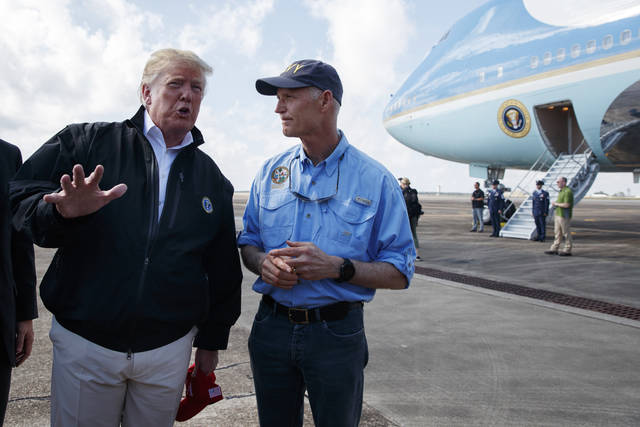LYNN HAVEN, Fla. — President Donald Trump marveled at the roofless homes and uprooted trees he saw Monday while touring Florida Panhandle communities ravaged by the force of Hurricane Michael.
Trump toured devastated coastal communities by air, land and foot before he and the first lady helped hand out bottled water at a Federal Emergency Management Agency aid distribution center, where the needy signed up for temporary housing and picked up clothing, diapers, water and other supplies.
The president said someone described Hurricane Michael to him as being “like a very wide, extremely wide, tornado.”
“Look behind you. I mean, those massive trees are just ripped out of the earth. This is really incredible,” Trump said.
Trump narrowly won Florida over Democrat Hillary Clinton in the 2016 presidential election, boosted by strong voter turnout in the Panhandle.
The state is important to Trump not only for his hopes of being re-elected in 2020 but also as he campaigns aggressively to help Republicans expand their slim 51-49 majority in the U.S. Senate. Fellow Republican and Florida Gov. Rick Scott is running for the Senate, partly at Trump’s urging, and is in a close contest against Democratic incumbent Bill Nelson just weeks before Election Day. Scott shadowed Trump throughout Monday’s visit.
Trump and his wife, Melania, initially saw uprooted trees and houses topped with blue tarps after his helicopter lifted off from Eglin Air Force Base near Valparaiso, his first stop after leaving Washington. But the severity of the damage worsened significantly as Trump approached Mexico Beach, which was nearly wiped off the map after taking a direct hit from the hurricane and its 155 mph (250 kph) winds last week.
Many of the houses in the town of about 1,000 people had no roofs. In some cases, only the foundations were left standing. A water tower lay on its side, and 18-wheelers were scattered in a parking lot like children’s toys.
In Panama City, where Trump landed, power poles bowed toward the ground, pieces of metal roofing were scattered about and pine trees had been uprooted or snapped in half. The view on the drive toward Panama City included houses smashed by trees, bent billboards and a demolished trailer park.
In nearby Lynn Haven, where the mayor said there was no loss of life, Trump walked up to a house where a massive pine tree lay on the front yard next to a palm tree that stood tall. Repairs were being made to the home, owned by Michael Rollins, who told Trump he rode out the storm there.
“I knew I had made my commitment to stay with my animals. I have two dogs and a parrot,” Rollins told Trump.
More than 190,000 homes and businesses in Florida were without electricity as of Sunday, days after the hurricane hit. That’s in addition to about 120,000 in Georgia, where Trump arrived later Monday afternoon and planned to survey hurricane damage. Residents also grappled with widespread cellphone outages.
Throughout the day, the president profusely praised Scott’s hurricane response.
“The job they’ve done in Florida has been incredible,” Trump told reporters. He told Scott: “You’re a great governor.”
Scott said FEMA had granted all his requests and that he’d spoken with Trump “almost every day.”
“Every time I’ve called, he’s come through,” Scott said.
The mood at the aid distribution center seemed lighthearted despite the surrounding devastation, as Trump bantered with a crowd that seemed more interested in selfies with him than in the bottled water he was offering in the heat and humidity.
A woman carrying a toddler posed for a photo and then told Trump he should come back for barbecue. Another woman thanked the first lady for her anti-bullying campaign.
The death toll from Michael’s destructive march from Florida through Virginia stood at 17, with just one confirmed death in Mexico Beach.
———
Superville reported from Washington.



